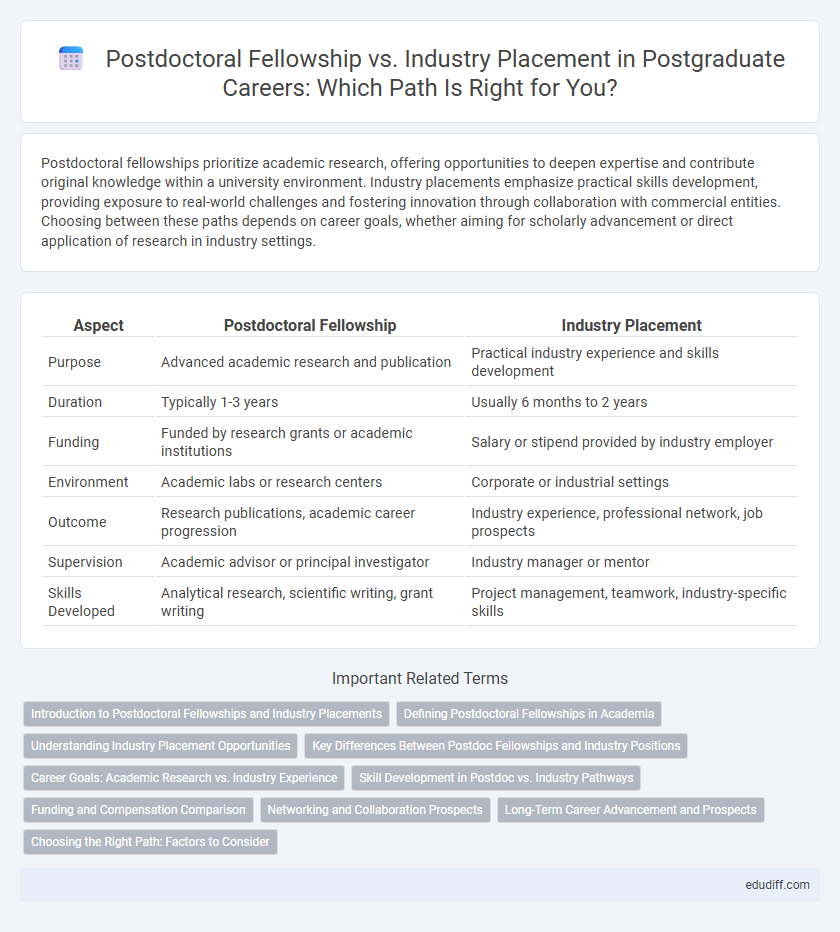Postdoctoral fellowships prioritize academic research, offering opportunities to deepen expertise and contribute original knowledge within a university environment. Industry placements emphasize practical skills development, providing exposure to real-world challenges and fostering innovation through collaboration with commercial entities. Choosing between these paths depends on career goals, whether aiming for scholarly advancement or direct application of research in industry settings.
Table of Comparison
| Aspect | Postdoctoral Fellowship | Industry Placement |
|---|---|---|
| Purpose | Advanced academic research and publication | Practical industry experience and skills development |
| Duration | Typically 1-3 years | Usually 6 months to 2 years |
| Funding | Funded by research grants or academic institutions | Salary or stipend provided by industry employer |
| Environment | Academic labs or research centers | Corporate or industrial settings |
| Outcome | Research publications, academic career progression | Industry experience, professional network, job prospects |
| Supervision | Academic advisor or principal investigator | Industry manager or mentor |
| Skills Developed | Analytical research, scientific writing, grant writing | Project management, teamwork, industry-specific skills |
Introduction to Postdoctoral Fellowships and Industry Placements
Postdoctoral fellowships offer recent PhD graduates intensive research opportunities to deepen expertise and contribute to academic advancements, often within university or research institute settings. Industry placements provide practical, hands-on experience in corporate environments, enabling postgraduate researchers to apply their skills directly to business challenges and innovation projects. Both pathways enhance career prospects but differ in focus, with fellowships emphasizing scholarly development and placements prioritizing real-world industry engagement.
Defining Postdoctoral Fellowships in Academia
Postdoctoral fellowships in academia are research positions awarded to individuals who have recently completed their doctoral studies, allowing them to deepen expertise and contribute to scholarly publications and grant proposals. These fellowships prioritize advancing fundamental research within universities, fostering academic career development and mentorship opportunities. Unlike industry placements, postdoctoral roles emphasize theoretical innovation, academic networking, and preparation for tenure-track faculty positions.
Understanding Industry Placement Opportunities
Industry placement opportunities provide postgraduate researchers with practical experience and direct exposure to real-world applications of their academic knowledge. These placements often include collaborative projects with companies, fostering networking and skill development tailored to industry needs. Understanding the structure and expectations of industry placements helps postdoctoral fellows enhance their career prospects beyond academia.
Key Differences Between Postdoc Fellowships and Industry Positions
Postdoctoral fellowships primarily emphasize academic research, publishing, and contributing to scientific knowledge, whereas industry placements focus on practical applications, product development, and teamwork within commercial settings. Postdoc positions often provide opportunities for independent study and advancement within academia, while industry roles prioritize project management, innovation, and direct impact on organizational goals. Funding sources and evaluation metrics also differ significantly, with fellowships typically supported by grants and judged by research output, while industry roles are funded by company budgets and assessed through performance and deliverables.
Career Goals: Academic Research vs. Industry Experience
Postdoctoral fellowships primarily target researchers aiming to deepen expertise and publish extensively within academic fields, enhancing prospects for tenure-track positions. Industry placements emphasize practical skills and real-world problem solving, facilitating transitions into corporate roles with immediate impact and innovation-driven projects. Aligning career goals with these paths ensures focused development, whether pursuing groundbreaking academic research or advancing industry-specific expertise.
Skill Development in Postdoc vs. Industry Pathways
Postdoctoral fellowships emphasize advanced research skills, critical thinking, and academic publishing, fostering expertise in specialized scientific methodologies. Industry placements prioritize practical, cross-functional skills such as project management, teamwork, and commercialization, aligning more closely with business objectives and market-driven innovations. Both pathways enhance professional skill development, but postdoctoral roles develop deep academic competencies, while industry experiences build versatile, applied skills for diverse career trajectories.
Funding and Compensation Comparison
Postdoctoral fellowships typically offer funding through research grants or academic institutions, providing a stipend or salary that supports independent research activities with a focus on academic development. Industry placements generally provide higher compensation packages including competitive salaries, bonuses, and benefits, as they align with corporate budgets and business objectives. Funding in postdoctoral fellowships is often limited in duration and scope, whereas industry placements offer more stable, long-term financial support tied to organizational roles.
Networking and Collaboration Prospects
Postdoctoral fellowships offer extensive networking opportunities within academia, allowing researchers to collaborate closely with experts in their field and participate in conferences and seminars. Industry placements provide direct access to corporate networks, fostering collaborations with practitioners and multidisciplinary teams focused on applied research and commercial innovation. Both paths cultivate professional relationships, but postdoctoral fellowships emphasize scholarly connections while industry placements enhance ties with business and technology sectors.
Long-Term Career Advancement and Prospects
A postdoctoral fellowship offers advanced research experience, fostering academic expertise and increasing opportunities for tenure-track positions or specialized roles in research institutions. Industry placements provide practical skills, professional networking, and exposure to commercial environments, enhancing employability in corporate sectors and accelerating progression into leadership or technical management roles. Long-term career advancement is influenced by the alignment of postdoctoral research skills or industry experience with evolving market demands and personal career goals.
Choosing the Right Path: Factors to Consider
Choosing between a postdoctoral fellowship and an industry placement requires evaluating goals such as research focus, career trajectory, and skill development. Postdoctoral fellowships emphasize academic research, publication opportunities, and specialized expertise, ideal for those pursuing tenure-track positions. Industry placements offer practical experience, networking in corporate environments, and exposure to product development, aligning with careers in applied science or business sectors.
Postdoctoral Fellowship vs Industry Placement Infographic

 edudiff.com
edudiff.com